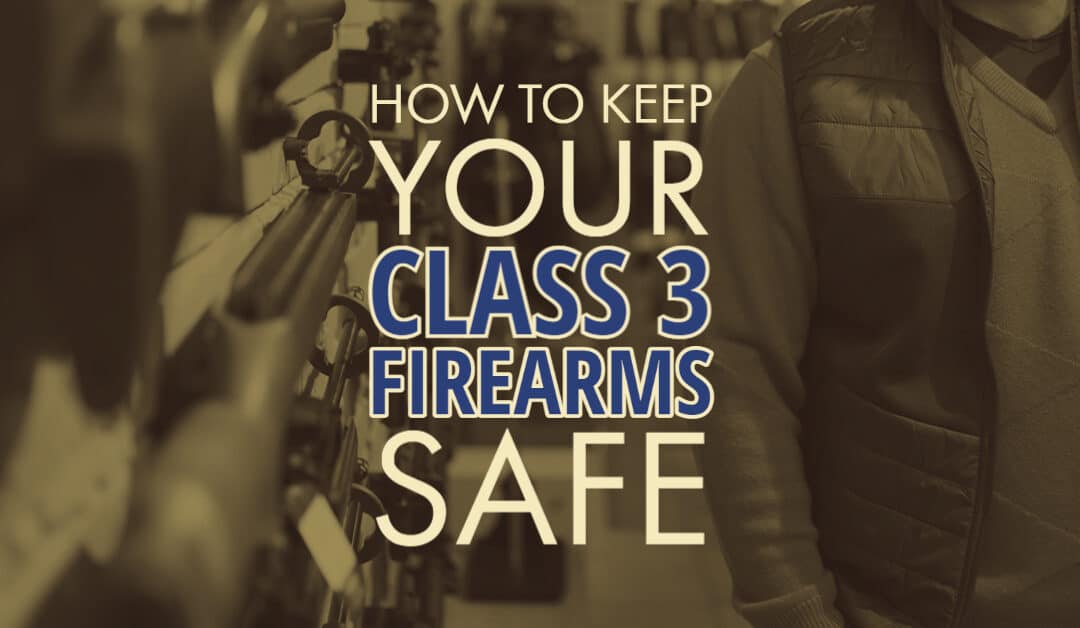A popular term is “Class 3 Firearm.” which usually means an NFA gun or a firearm outlawed by the National Firearms Act of 1934 or The Gun Control Act of 1968. If you own class 3 firearms, you probably know the firearm itself is not a “class 3 firearm,” but the dealer that sells it to you must have a class 3 or better license to sell to you. You must have proper licensing from the ATF to own these guns. However, keeping them safe is another matter. Learn how to keep your class 3 firearms safe.
Why Own an Outlawed Gun?
Many individuals own NFA guns or silencers. According to the NRA-ILA, “short-barreled rifles and shotguns have become increasingly popular for home defense and defensive-skills-based marksmanship training and competitions, and sound suppressors have become increasingly popular for marksmanship training and competitions, and for hunting.” Increased ownership means that more people need the licensing to own these types of weapons.
Also, many of these “outlawed” weapons are passed down within a family, often illegally. It makes sense to learn about the gun laws so that you and your family don’t face trouble for your gun ownership.
Gun Laws in NC
Because of the federal laws about NFA weapons, you must register them with the federal government. NFA law makes illegal:
- Fully-automatic firearms (termed “machineguns”)
- Rifles and shotguns that have an overall length under 26 inches
- Rifles with a barrel under 16 inches
- Shotguns with a barrel under 18 inches
- Firearm sound suppressors (termed “silencers”)
- “Destructive devices” (primarily explosives and the like, but also including firearms over .50 caliber, other than most shotguns) Devices such as grenades, bombs, explosive missiles, poison gas weapons, etc.
- Any firearm with a bore over 0.50 inch except for shotguns or shotgun shells which are particularly suitable for sporting purposes.
- Revolving-cylinder shotguns
- Importation of fully-automatic firearms for private purposes
- No domestic manufacture of fully-automatic firearms for private purposes (you may apply for a license if you “intend” to sell these firearms)
Owning Class 3 Firearms Safely
If you own a gun collection or a “Class 3” NFA weapon, a gun trust can help you legally share weapons with friends or pass down guns to others as an inheritance. If you let a friend shoot your gun or give an NFA gun to your grandson, they could face felony charges, unless they get licensed to own the weapon by the ATF.
Possessing or firing an NFA firearm is illegal without the proper licensing. A gun trust allows multiple people to own these regulated weapons without interference from the ATF. Gun trusts give safety benefits that are worth looking into.
What is a Gun Trust?
A trust is simply a management framework that owns your assets for you. Trusts “own” your guns according to the terms of the trust that you draw up with your attorney. You no longer claim personal ownership of them. A gun trust can prevent criminal liability, help your estate avoid probate court, and distribute gun collection assets after you die.
A gun trust is a legal framework that owns your guns for you. It’s operated a bit like a business. The person who manages the trust assets (your guns) is called the trustee. With some types of trusts, you can act as a trustee. Your trust agreement lays out what will happen with the assets and when.
For example, if you have a grandson you’d like to pass a short-barreled rifle down to, but he is only 15 now, a trust may hold onto the weapon and release it to him once he meets all of the conditions for eligibility to own the gun himself legally.
If you belong to a hunting club, you can add the members of the club onto your trust documentation so that they also own the class 3 firearms and may legally share the guns with you.
Public Announcements of Your Guns
You can avoid a public announcement of your weapons during probate. Probate includes an inventory of all assets in your estate. The probate process is public, and the court lists all of your assets in the public record of the estate’s inventory. Anyone can choose to witness this public process.
If you do not have a gun trust when you die, your guns will pass through the probate process. The executor of your estate will assess the value of each weapon and then list them as a part of your estate. This inventory happens as soon as you pass away. If the executor finds an NFA weapon, they are legally required to report it to the ATF for confiscation.
To avoid ATF confiscation of your weapons, you may open a gun trust. The probate court does not interfere with gun trust assets. A trust’s assets continue to be managed by the trustee you name even after your death. An executor of your will does not list the items of a gun trust in a public inventory.
We Can Help
If you own a gun collection or other weapons that need licensing from the ATF, contact us to set up a gun trust to keep your weapons safe. Protect others who may unknowingly inherit these weapons and face charges for possessing your guns. Share your collection with others without fear of charges.
At Cape Fear Law, we work with you to draw up a gun trust that meets your future goals for your guns.
Our experienced attorneys understand how the law works surrounding class 3 firearms ownership. Contact us and find out how we can help you.
Footnotes:

